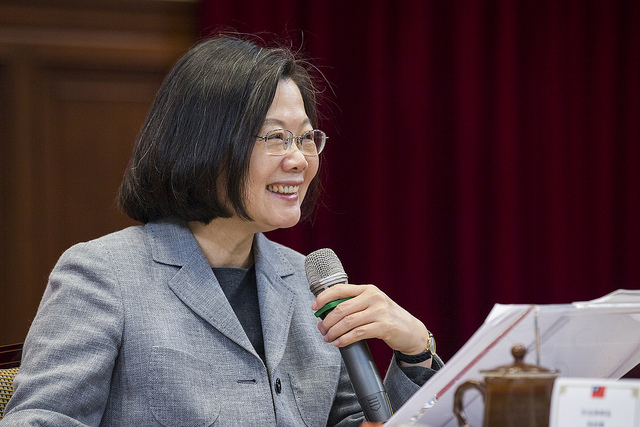News & activities
 News releases
News releases
President Tsai Ing-wen attended a reception for the international press corps on the morning of January 5. At the reception, the president addressed recent remarks by China's president pushing for the adoption of a "one country, two systems" model for Taiwan. She then reiterated her approach and Taiwan's unwavering position, and once again called on China to move towards democracy and see Taiwan from a democratic perspective, which is the only way to understand what Taiwanese really think and gain the trust of international society.
President Tsai stated that remarks regarding cross-strait relations on January 2 by China's President Xi Jinping touched on two of Taiwan's fundamental core interests. The first was when President Xi equated the "1992 Consensus" with the "one China" and "one country, two systems" formulations, and pledged to impose the latter system on Taiwan. The second was President Xi's intention to circumvent Taiwan's democratic mechanisms and democratically elected government to conduct so-called "consultations" with various Taiwan political parties.
President Tsai stated that this approach does not respect our democratic mechanisms and system of government, and would be a divisive force in Taiwan. Both approaches undermine Taiwan's most cherished core interests, which the people of Taiwan absolutely will not accept. As president, she felt it was necessary to stand up, and clarify our position.
The president noted that everyone should clearly recognize that these events and China's recent behavior make them the biggest variable in cross-strait and regional stability. For over two years, Taiwan's attitude in handling cross-strait relations has been to avoid provocation and not create trouble. China, however, has done just the opposite. Examples include China's attempts to alter Taiwan's designation in the international community, military threats like circling Taiwan with military aircraft and naval vessels, and even using disinformation to interfere in Taiwan's democratic elections, which also caused alarm in the international community.
The president also stated that because Beijing has already defined the term "1992 Consensus" as "one country, two systems," there is no longer any room for ambiguity, and Taiwan must send the international community a clear and consistent message. She urged all political parties in Taiwan to clearly state that "We reject one country, two systems," voice the people's will without ambiguity, and stop talking about the "1992 Consensus."
The president emphasized that Taiwan is not opposed to cross-strait interaction, and is willing to sit down for talks. But Taiwan, like many other members of the international community, is a democratic nation. Such talks must therefore be authorized and monitored by the public, and conducted on a government-to-government basis with each side representing its people.
President Tsai also called on China's government to focus on issues that are important to the common interests of the people like African swine fever. As a major power, China should be responsible to the international community, and not cover up the situation surrounding the epidemic.
President Tsai stated that by cooperating with Taiwan and regional countries to prevent the spread of swine fever, Beijing would be making a good start towards building goodwill. She further added: "Obtaining reports about the epidemic should not require the use of 'political passwords!'" The president also urged the World Organisation for Animal Health (OIE) to intervene as soon as possible, and enlist all countries in the region to prevent the spread of swine fever together. Taiwan would certainly be willing to participate and provide assistance. The president noted that Taiwan has excellent animal disease prevention capabilities, and would be more than happy to contribute to the region on this issue.
President Tsai said that the reasons why Taiwanese are guarded and apprehensive, and thus cannot accept the "one country, two systems" model, are quite simple: China lacks a democratic system, has a poor human rights record, and has never renounced the use of force against Taiwan. The president said that these are three reasons why the people of Taiwan have serious doubts about China.
The president called on China to learn to see Taiwan from a democratic perspective. This is also why, in a recent talk, she expressed hope that China will move towards democracy, because that is the only way to understand what Taiwanese really think. We also hope that China will make progress in terms of protecting human rights, she said.
A German media outlet then asked President Tsai what she hopes members of the international community, such as Germany, will do for Taiwan given our current predicament. The president pointed out that Taiwan is a democratic country that emphasizes the will and aspirations of its people, and values human rights. Taiwan has been an important and faithful practitioner of all the values that are important to the international community.
The president said that when a country like ours faces challenges and threats, we hope that the international community will take these issues seriously, and help us by speaking up on our behalf. Taiwan has worked long and hard to implement democracy and shared international values. So for a country like ours to suffer threats and encroachment undermines democracy, and many other cherished values. She also said that if the international community does not speak out for or assist us when we face these kinds of situations, we can only ask: Which country will be next?
The press reception lasted about 80 minutes, with a total of 46 reporters from 27 news media agencies from the United States, Europe, Japan, and Asia.



